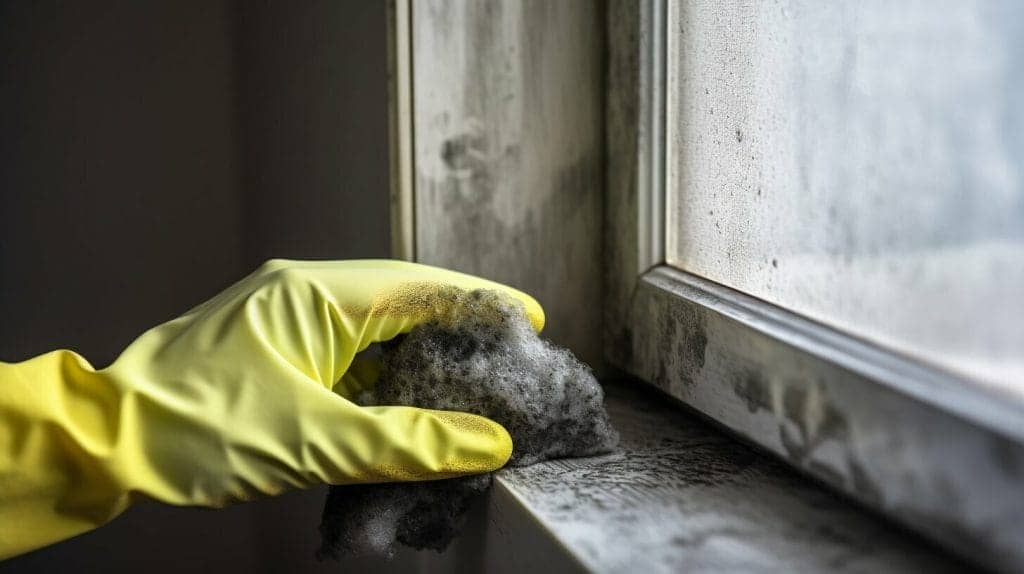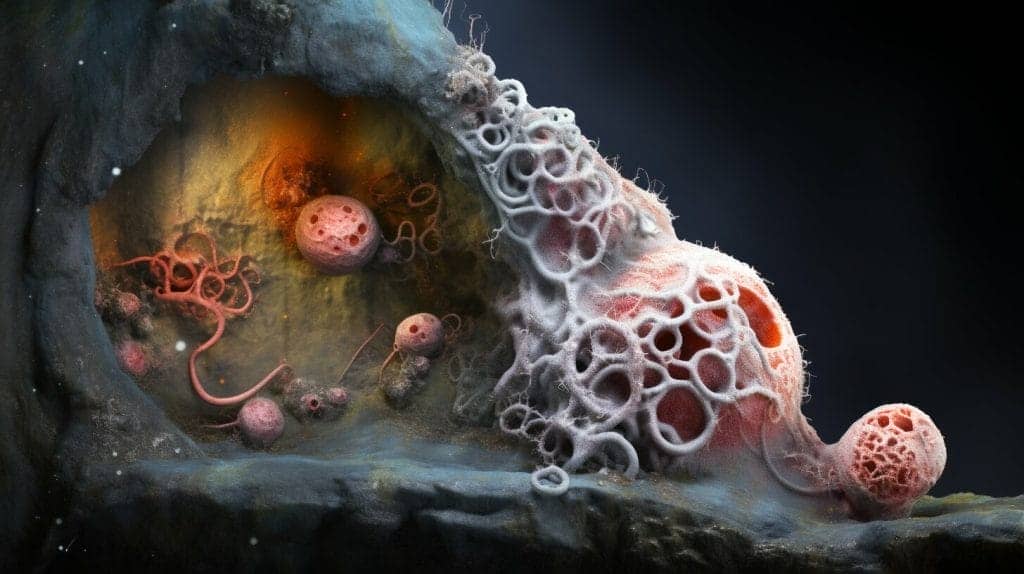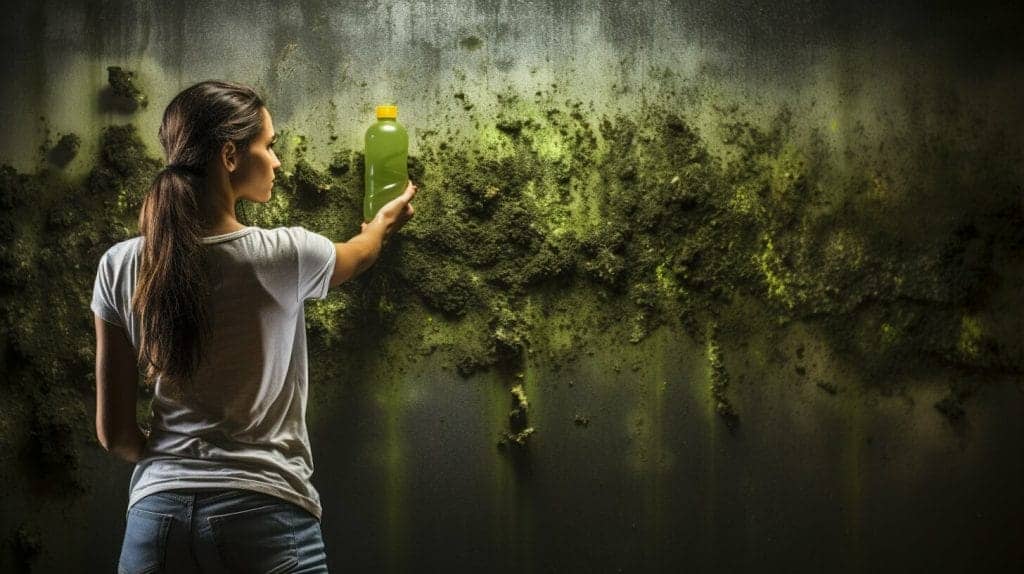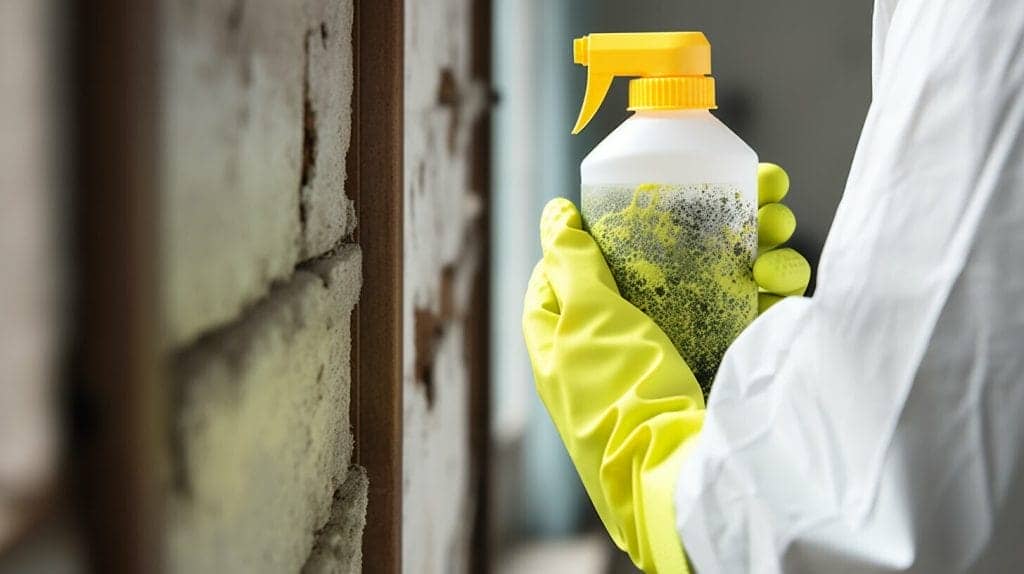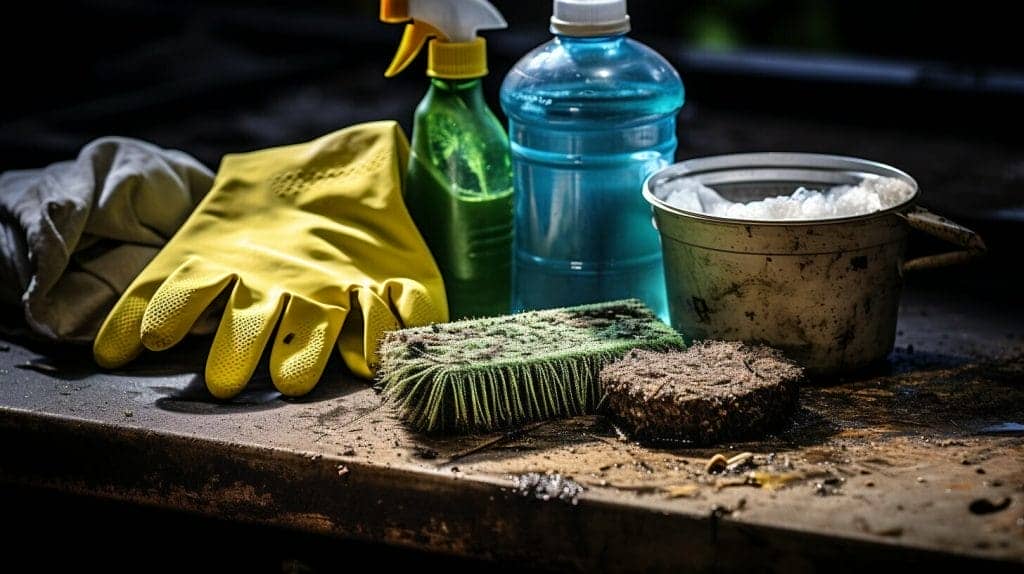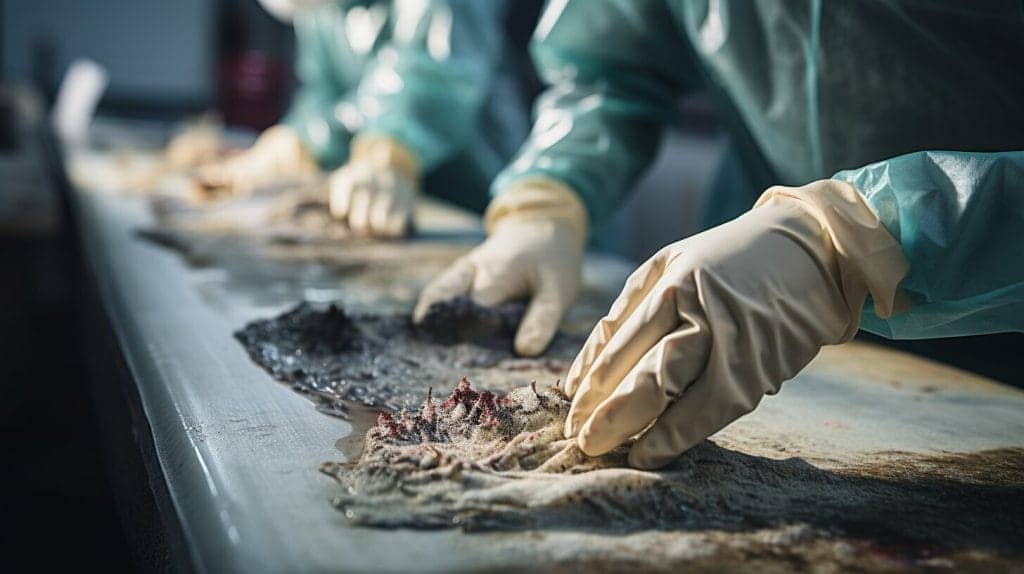Mycotoxins are toxic compounds produced by certain types of molds that can be found in various environments, including food, water, and indoor spaces. Understanding the immune system’s response to mycotoxin exposure is crucial in defending the body against these harmful substances.
In this article, we will explore the complex relationship between mycotoxins and immune cells, discussing the mechanisms by which these toxins activate immune cells and the various ways immune cells respond to mycotoxin exposure. We will also highlight key research findings on immune cell response to mycotoxins and discuss effective treatments for mold toxicity that address immune cell response and overall well-being.
Key Takeaways:
- Mycotoxins are toxic compounds produced by certain types of molds that can be found in various environments
- Understanding the immune system’s response to mycotoxin exposure is crucial in defending the body against these harmful substances
- In this article, we will explore the complex relationship between mycotoxins and immune cells, discussing the mechanisms by which these toxins activate immune cells and the various ways immune cells respond to mycotoxin exposure
- Effective treatments for mold toxicity address immune cell response and overall well-being
Understanding Immune Cells and Their Role in the Body
Immune cells play a vital role in defending the body against foreign invaders, including mycotoxins. The immune system is a complex network of cells, tissues, and organs that work together to identify and eliminate harmful substances.
The main types of immune cells are:
- T-cells
- B-cells
- Natural Killer (NK) cells
- Macrophages
- Dendritic cells
T-cells and B-cells are known as adaptive immune cells because they can adapt to recognize specific antigens, including those found on mycotoxins. NK cells are part of the innate immune response and can identify and kill infected cells without prior exposure to a specific antigen. Macrophages and dendritic cells are professional antigen-presenting cells that can engulf and present mycotoxins to other immune cells for recognition and elimination.
Immune System Response to Mycotoxins
When mycotoxins enter the body, they can stimulate the immune system’s response. The type of immune response can depend on the mycotoxin’s structure, concentration, and duration of exposure. In some cases, the immune system can effectively eliminate mycotoxins before they cause harm. However, chronic exposure to mycotoxins can lead to immune system dysfunction and the development of various health problems.
Mycotoxins: Definition and Sources
Mycotoxins are toxic substances produced by certain types of fungi or molds, which can be found in various environments such as food, water, and indoor spaces. These toxic substances can pose a threat to human health, particularly when exposure is prolonged or frequent.
Some common sources of mycotoxin exposure include contaminated crops, damp or water-damaged buildings, and certain types of food such as peanuts, corn, and wheat. The presence of mycotoxins in these environments can lead to a range of health problems, from allergies and asthma to more severe conditions such as cancer and neurological disorders.
Immune Cell Activation by Mycotoxins
When mycotoxins enter the body, they activate immune cells through various mechanisms. One of the most notable mechanisms is the release of pro-inflammatory molecules, such as cytokines, which attract immune cells to the site of exposure. Once immune cells arrive, they can initiate immune cell-mediated responses to eliminate the mycotoxins.
Research has shown that different types of immune cells respond to mycotoxins in distinct ways. For example, macrophages and dendritic cells can phagocytose mycotoxin-containing particles, whereas T cells can recognize mycotoxin fragments presented on the surface of infected cells and initiate a targeted immune response.
Interestingly, some mycotoxins can also impair immune cell function, leading to a reduced immune response. For example, aflatoxins have been shown to inhibit T cell proliferation and cytokine production.
Mycotoxin-Related Immune Cell Reactions
Immune cells play a critical role in defending the body against mycotoxins, recognizing and responding to these toxic substances through a range of mechanisms. When exposed to mycotoxins, immune cells can engage in various reactions that contribute to the elimination of these harmful compounds.
One such reaction is cell death, which can occur through apoptosis or necrosis. Apoptosis is a programmed process of cell self-destruction, while necrosis is a more chaotic process of cell death that can result in tissue damage. Both mechanisms are important for eliminating damaged or infected cells, including those affected by mycotoxins.
Immune cells can also produce cytokines in response to mycotoxin exposure. Cytokines are signaling molecules that enable communication between cells and coordinate immune responses. In the context of mycotoxin exposure, cytokines can induce inflammation and recruit additional immune cells to the site of toxin exposure, contributing to the elimination of the toxic substance.
Phagocytosis is another important mechanism through which immune cells can respond to mycotoxins. This process involves the engulfment and degradation of foreign substances, including mycotoxins, by immune cells such as macrophages. By removing mycotoxins from the body through phagocytosis, immune cells can prevent their harmful effects from spreading further.
Overall, the ability of immune cells to respond to mycotoxin exposure through various reactions is critical for defending the body against these toxic substances. Understanding the specific mechanisms of immune cell response to mycotoxins can inform effective treatment approaches and improve overall health outcomes.
Research Findings on Immune Cell Response to Mycotoxins
Recent research has shed light on the complex immune cell response to mycotoxins and its implications for health. One study found that exposure to mycotoxins can lead to activation of various immune cells, including macrophages and dendritic cells, which can produce pro-inflammatory cytokines and initiate immune cell-mediated responses. Another study highlighted the potential for mycotoxins to induce cell death in immune cells and disrupt the overall balance of the immune system.
Results from these studies suggest that understanding the immune cell response to mycotoxins is key to effectively addressing mold toxicity and preventing its negative impact on health. Researchers are continuing to explore this topic, with the goal of identifying new strategies and treatments for improving immune cell function and reducing the negative effects of mycotoxin exposure.
One promising area of research involves the use of immunomodulatory agents to support immune function in the context of mycotoxin exposure. These agents, which include compounds such as beta-glucans and probiotics, may help to regulate immune cell activity and enhance the body’s ability to defend against toxic substances like mycotoxins.
Holistic Approach to Mold Toxicity Treatment
When it comes to treating mold toxicity, taking a holistic approach that addresses immune cell response and overall well-being can be highly effective. At Oasis Medical Institute in Tijuana, MX, Dr. Francisco Contreras MD and his team of experts offer a comprehensive and integrative approach to mold toxicity treatment that can help patients achieve optimal health.
This holistic approach to mold toxicity treatment involves a combination of detoxification protocols, immune system support, and lifestyle modifications to help optimize immune cell response and reduce the negative effects of mycotoxin exposure.
The Importance of a Holistic Approach
With mold toxicity, addressing immune cell response is essential to effective treatment. Immune cells play a key role in defending the body against toxic substances and reducing inflammation, making them a critical factor in mold toxicity recovery.
However, a holistic approach to mold toxicity treatment goes beyond simply addressing immune cell response. It also considers factors such as nutrition, stress management, and other lifestyle factors that can impact overall health and well-being.
Treating Mold Toxicity at Oasis Medical Institute
At Oasis Medical Institute, treatment plans are tailored to each patient’s individual needs, taking into account their immune cell response and overall health status. The team of experts at Oasis Medical Institute works to support and optimize immune cell response through a range of integrative therapies, including acupuncture, herbal medicine, and mind-body practices.
In addition to these therapies, Oasis Medical Institute also offers personalized nutrition plans and lifestyle modifications to support overall health and immune cell function. With a comprehensive and integrative approach to mold toxicity treatment, patients can achieve optimal health and well-being.
Book a Consultation
To learn more about the holistic mold toxicity treatment program at Oasis Medical Institute or to book a consultation, please call 866-868-1992. The team of experts at Oasis Medical Institute is committed to helping patients achieve optimal health and well-being through integrative and personalized treatment approaches.
Addressing Immune Cell Response in Mold Toxicity Treatment
Given the crucial role of immune cells in defending the body against toxic substances, it is essential to address immune cell response in the treatment of mold toxicity. While individual treatment plans may vary based on the patient’s overall health status and immune system function, several strategies have been shown to be effective in supporting immune cell response and minimizing the negative impact of mycotoxin exposure.
| Strategy | Description |
|---|---|
| Detoxification protocols | Detoxification protocols, such as sauna use, chelation therapy, and targeted supplements, can help remove mycotoxins from the body, reducing immune cell activation and inflammation. |
| Immune system support | By providing the body with essential nutrients and immune-supportive supplements, immune system function can be optimized, boosting the body’s ability to fight off mycotoxins and other toxins. |
| Lifestyle modifications | Stress management, adequate sleep, regular exercise, and other lifestyle modifications can play a significant role in enhancing immune cell function and reducing the negative impact of mycotoxins on the body. |
By combining these strategies with a comprehensive, personalized approach to mold toxicity treatment, patients can experience improved immune cell response and overall well-being. Such an approach is offered at the Oasis Medical Institute in Tijuana, MX, where Dr. Francisco Contreras MD and his team combine cutting-edge therapies with a holistic approach to treatment.
The Role of Nutrition in Supporting Immune Cell Health
Proper nutrition is essential for a healthy immune system and optimal immune cell response. Certain nutrients play a critical role in supporting the immune system’s ability to defend against mycotoxin exposure and other harmful substances, and deficiencies can impair immune function.
Vitamin C is a powerful antioxidant that helps protect immune cells from oxidative stress and enhances their ability to fight off infections. Good sources of vitamin C include citrus fruits, berries, kiwi, and broccoli.
Vitamin D is another essential nutrient for immune system function and has been shown to reduce the risk of respiratory infections. It can be obtained through sun exposure or through foods such as fatty fish, egg yolks, and fortified dairy products.
Zinc is crucial for immune cell proliferation and function, and deficiencies have been linked to impaired immune response. Good dietary sources of zinc include oysters, beef, poultry, beans, and nuts.
Omega-3 fatty acids are anti-inflammatory and can help reduce the production of pro-inflammatory cytokines that can lead to immune dysfunction. Good sources of omega-3s include fatty fish, walnuts, and flaxseeds.
In addition to these specific nutrients, a balanced and varied diet that includes plenty of fruits, vegetables, whole grains, and lean protein is important for overall health and immune cell function.
Lifestyle Modifications to Enhance Immune Cell Function
In addition to targeted treatments, making certain lifestyle modifications can help support immune cell function and mitigate the negative effects of mycotoxin exposure.
- Stress Management: Chronic stress can weaken the immune system, so implementing stress-reducing activities like yoga, meditation, or deep breathing exercises can be beneficial.
- Adequate Sleep: Getting enough restful sleep each night is crucial for immune health, as it allows the body to repair and regenerate cells.
- Regular Exercise: Moderate exercise has been shown to boost immune function and decrease inflammation, so incorporating physical activity into one’s routine can be helpful.
In addition to these lifestyle factors, it’s important to maintain a healthy diet that provides the necessary nutrients for immune cell function. This includes consuming a variety of fruits and vegetables, healthy fats, and lean protein sources.
By adopting these healthy lifestyle habits, individuals can support their immune system response to mycotoxins and other environmental toxins.
Integrative Therapies for Supporting Immune Cell Response
Integrative therapies can play a valuable role in supporting immune cell response to mycotoxins. These therapies focus on a whole body approach to health and wellness, incorporating a range of modalities to support the body’s natural healing abilities.
Acupuncture is one such therapy that has been shown to have immune-boosting effects, enhancing the activity of immune cells and promoting the production of cytokines. Herbal medicine can also be used to support immune cell activity, with various herbs having anti-inflammatory and immune-enhancing properties.
Mind-body practices such as meditation and yoga can also be effective in supporting immune cell response, with research showing that these practices can reduce inflammation and enhance immune function. Additionally, nutritional and dietary interventions can be used to optimize immune cell health, with specific nutrients such as vitamin C and zinc having immune-enhancing properties.
When used in conjunction with conventional medicine, integrative therapies can offer a complementary approach to improving immune cell response and overall health. It is important to consult with a licensed healthcare provider experienced in integrative therapies to determine the best approach for each individual.
Personalized Treatment Approaches for Mold Toxicity
When dealing with mold toxicity, it’s important to remember that each person’s immune system responds differently to mycotoxins. Therefore, personalized treatment approaches are essential for achieving optimal health outcomes.
Doctors and clinicians at Oasis Medical Institute take a patient-centered approach to mold toxicity treatment. They conduct thorough evaluations of patients, taking into account their overall health status and individual immune cell response to mycotoxins. Based on this evaluation, personalized treatment plans are developed that include a combination of conventional and integrative therapies to address the specific needs of each patient.
Oasis Medical Institute: A Leader in Holistic Mold Toxicity Treatment
Oasis Medical Institute, located in Tijuana, Mexico, is a leading provider of holistic mold toxicity treatment. With a team of experienced doctors and practitioners, Oasis Medical Institute offers a comprehensive approach to treating mold toxicity, addressing not only the physical symptoms but also the underlying causes and overall well-being of the patient.
| Services Offered at Oasis Medical Institute |
|---|
|
The team at Oasis Medical Institute, led by Dr. Francisco Contreras MD, understands the important role that immune cell response plays in mold toxicity treatment. By addressing the immune system and overall health of the patient, the team is able to provide a personalized treatment approach that is effective and sustainable.
“At Oasis Medical Institute, we believe in treating the whole person, not just their symptoms. We take the time to understand each patient’s unique situation and develop a treatment plan that is tailored to their individual needs.” – Dr. Francisco Contreras MD
If you are struggling with mold toxicity and are interested in a holistic approach to treatment, consider booking a consultation at Oasis Medical Institute. Their team of experts will work with you to develop a personalized treatment plan that addresses immune cell response and overall well-being. To book a consultation, call 866-868-1992.
Book a Consultation for Holistic Mold Toxicity Treatment
If you’re interested in exploring holistic mold toxicity treatment options, book a consultation with the experts at Oasis Medical Institute. Dr. Francisco Contreras MD and his team offer a comprehensive approach to addressing mycotoxin-related immune cell response and overall health.
To schedule a consultation, you can call 866-868-1992 or visit their website for more information. By taking a personalized approach to treatment, the team at Oasis Medical Institute can help you achieve optimal health and well-being.
Conclusion
Understanding immune cell response to mycotoxins is crucial for effective treatment of mold toxicity and overall health. Immune cells play a key role in defending the body against toxic substances like mycotoxins, recognizing and responding to their presence. Exposure to mycotoxins can lead to immune cell activation, cell death, cytokine production, and other reactions that can have negative impacts on health.
Integrative treatments, such as those offered at Oasis Medical Institute in Tijuana, MX, can address immune cell response as a key component of holistic mold toxicity treatment programs. These treatments may include detoxification protocols, immune system support, nutrition and dietary guidance, lifestyle modifications, and personalized approaches tailored to individual needs.
In summary,
By focusing on immune cell response to mycotoxins, healthcare providers can offer comprehensive and personalized treatment options for mold toxicity. Oasis Medical Institute is a leader in providing holistic treatment programs, emphasizing the importance of addressing immune cell activity and overall well-being. Contact Oasis Medical Institute at 866-868-1992 to book a consultation and learn more about their approach to holistic mold toxicity treatment.
FAQ
Q: What is the immune cell response to mycotoxins?
A: The immune cell response to mycotoxins refers to the reaction of immune cells in the body when exposed to these toxic substances. Immune cells play a critical role in defending the body against foreign substances, and understanding their response to mycotoxins is important in assessing the effects and developing treatments for mycotoxin exposure.
Q: How do immune cells function in the body?
A: Immune cells are an essential part of the immune system and are responsible for recognizing and responding to foreign substances such as mycotoxins. They can release pro-inflammatory molecules, initiate immune cell-mediated responses, and perform functions like phagocytosis to eliminate harmful substances from the body.
Q: What are mycotoxins and where do they come from?
A: Mycotoxins are toxic substances produced by certain molds. They can be found in various environments, including food, water, and indoor spaces that have experienced mold growth. Exposure to mycotoxins can have harmful effects on the immune system and overall health.
Q: How do mycotoxins activate immune cells?
A: Mycotoxins can activate immune cells through various mechanisms. They can induce the release of pro-inflammatory molecules, trigger immune cell-mediated responses, and disrupt immune system function. These processes contribute to the overall immune cell activation and response to mycotoxin exposure.
Q: How do immune cells react to mycotoxin exposure?
A: Immune cells can react to mycotoxin exposure in several ways. They may undergo cell death, produce cytokines that influence the immune response, and engage in processes like phagocytosis to eliminate mycotoxins from the body. These reactions are part of the immune system’s defense mechanisms against mycotoxin toxicity.
Q: What research findings are available on the immune cell response to mycotoxins?
A: Research on the immune cell response to mycotoxins has provided valuable insights into the effects and mechanisms involved. Key studies have examined the activation and reactions of immune cells to mycotoxin exposure, contributing to our understanding of the immune response and potential treatment strategies.
Q: What is the holistic approach to mold toxicity treatment?
A: The holistic approach to mold toxicity treatment involves addressing not only the physical symptoms but also the overall well-being of the individual. It recognizes the importance of immune cell response and incorporates various complementary therapies to support the body’s healing process. Oasis Medical Institute in Tijuana, MX, offers a holistic Mold Toxicity treatment program with Dr. Francisco Contreras MD.
Q: How is immune cell response addressed in mold toxicity treatment?
A: Mold toxicity treatment focuses on addressing immune cell response through various strategies. These may include detoxification protocols to eliminate mycotoxins, immune system support to enhance immune cell function, and lifestyle modifications to reduce exposure and improve overall health.
Q: What role does nutrition play in supporting immune cell health?
A: Nutrition plays a crucial role in supporting immune cell health and optimizing their response to mycotoxin exposure. Certain nutrients, such as vitamins, minerals, and antioxidants, are essential for immune cell function, and a well-balanced diet can help strengthen the immune system’s ability to combat mycotoxins.
Q: What lifestyle modifications can enhance immune cell function?
A: Making certain lifestyle modifications can enhance immune cell function and minimize the negative impact of mycotoxin exposure. Managing stress levels, getting adequate sleep, and engaging in regular exercise are examples of lifestyle practices that can support immune cell health and overall well-being.
Q: What integrative therapies can support immune cell response to mycotoxins?
A: Integrative therapies offer additional support for immune cell response to mycotoxins. Acupuncture, herbal medicine, and mind-body practices are among the integrative therapies that can help enhance immune cell function, reduce inflammation, and support overall well-being.
Q: Why is personalized treatment important for mold toxicity?
A: Personalized treatment is important for mold toxicity because it takes into account individual immune cell response and overall health status. By tailoring treatment plans to each person’s unique needs, it maximizes effectiveness and improves outcomes in managing mold toxicity.
Q: What is Oasis Medical Institute’s expertise in holistic mold toxicity treatment?
A: Oasis Medical Institute in Tijuana, MX, is a leader in holistic mold toxicity treatment. With their integrative approach and expertise in addressing immune cell response, they provide comprehensive treatment programs that focus on the overall well-being of individuals affected by mold toxicity. Dr. Francisco Contreras MD is part of their expert team.
Q: How can I book a consultation for holistic mold toxicity treatment at Oasis Medical Institute?
A: To book a consultation for holistic mold toxicity treatment at Oasis Medical Institute, you can call 866-868-1992. Their experienced team will provide you with comprehensive care and guide you through the treatment process.
Dr. Francisco Contreras, MD is a renowned integrative medical physician with over 20 years of dedicated experience in the field of integrative medicine. As the Medical Director of the Oasis of Hope Hospital in Tijuana, Mexico, he has pioneered innovative treatments and integrative approaches that have been recognized globally for the treatment of cancer, Lyme Disease, Mold Toxicity, and chronic disease using alternative treatment modalities. Dr. Contreras holds a medical degree from the Autonomous University of Mexico in Toluca, and speciality in surgical oncology from the University of Vienna in Austria.
Under his visionary leadership, the Oasis of Hope Hospital has emerged as a leading institution, renowned for its innovative treatments and patient-centric approach for treating cancer, Lyme Disease, Mold Toxicity, Long-Haul COVID, and chronic disease. The hospital, under Dr. Contreras's guidance, has successfully treated thousands of patients, many of whom traveled from different parts of the world, seeking the unique and compassionate care the institution offers.
Dr. Contreras has contributed to numerous research papers, articles, and medical journals, solidifying his expertise in the realm of integrative medicine. His commitment to patient care and evidence-based treatments has earned him a reputation for trustworthiness and excellence. Dr. Contreras is frequently invited to speak at international conferences and has been featured on CNN, WMAR2 News, KGUN9 News, Tyent USA, and various others for his groundbreaking work. His dedication to the medical community and his patients is unwavering, making him a leading authority in the field.
Contreras has authored and co-authored several books concerning integrative therapy, cancer, Lyme Disease and heart disease prevention and chronic illness, including "The Art Science of Undermining Cancer", "The Art & Science of Undermining Cancer: Strategies to Slow, Control, Reverse", "Look Younger, Live Longer: 10 Steps to Reverse Aging and Live a Vibrant Life", "The Coming Cancer Cure Your Guide to effective alternative, conventional and integrative therapies", "Hope Medicine & Healing", "Health in the 21st Century: Will Doctors Survive?", "Healthy Heart: An alternative guide to a healthy heart", “The Hope of Living Cancer Free”, “Hope Of Living Long And Well: 10 Steps to look younger, feel better, live longer” “Fighting Cancer 20 Different Ways”, "50 Critical Cancer Answers: Your Personal Battle Plan for Beating Cancer", "To Beat . . . Or Not to Beat?", and “Dismantling Cancer.”



